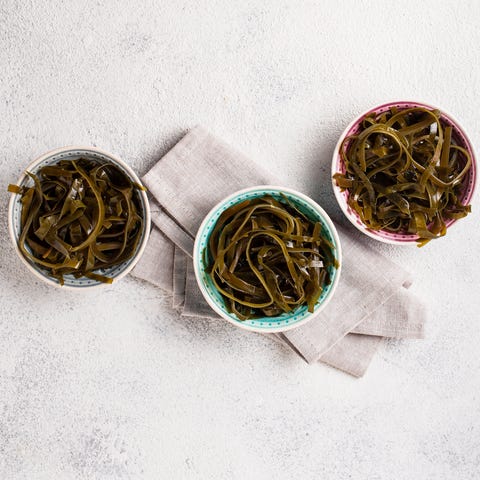Kelp is trending in the wellness industry — and for good reason. Filled with nutrients that include iron, vitamin K, iodine, calcium and other essential vitamins, this nutrient-dense brown algae is quickly coming into focus for those who are trying to bolster a holistically healthy diet.
It is also considered a climate-conscious food by industry regulators, which is being used to help absorb carbon in our environment and help make our oceans healthier and less acidic. In raising and harvesting kelp forests, manufacturers may help to clean up the ocean environments they work in, making it a safer place for fish, too.
We spoke to experts in food and health industries to learn more about kelp and its potential health benefits.
What is kelp?
Also known as kombu in international markets, kelp is native to north Japan, and is prepared and dried in thick sheets for individual use, explains Ann Ziata, chef at the Institute of Culinary Education in New York City.
“Kelp has naturally occurring glutamates, which means that it usually acts as a flavor enhancer,” she tells Good Housekeeping. “It can be used to add umami to broths, soups and other dishes. I would describe the flavor as mildly oceanic and vegetal with a sea spray aroma.” Plus, it contains a slew of minerals (more on that later) that can make a wide array of vegetarian dishes, in particular, more nutritionally dense.
Those who have already incorporated kelp into their culinary routine know how delicious it is — and as it becomes more mainstream, there are more ways than ever to enjoy kelp at home.
“You can add kelp to soups, stews and stocks — like a bay leaf, it will infuse flavor into the dish while cooking, [though it is] usually not eaten as it’s quite tough,” Ziata says. “You can chop it into smaller pieces after it’s been cooked, and then stir it back into the dish. You can also fry dried kelp into ‘chips’ for a fun crispy snack or garnish.”
Kelp cubes can also fortify smoothies, whereas kelp noodles shine in grain bowls or soups; and kelp itself can be used as a salad base, added into warming wintery broths, or even fermented as a topping on other favorites. It is a key staple in many diets in Asian countries and social media trends are signaling that it’ll become one of the buzziest ingredients in the U.S. in 2023.
Kelp nutrition facts
Kelp is full of rich nutrients that include iron, vitamin K, iodine, as well as being a significant source of magnesium and fiber.
According to the U.S. Department of Agriculture, 1 cup of raw kelp contains:
- Calories: 43
- Protein: 1.68 g
- Fiber: 1.3 g
- Calcium: 168 mg
- Iron: 2.85 mg
- Magnesium: 121 mg
- Potassium: 89 mg
- Sodium: 233 mg
- Zinc: 1.23 mg
- Copper: 0.13 mg
- Manganese, Mn: 0.2 mg
- Folate: 180 µg
- Vitamin A: 116 IU
- Vitamin K: 66 µg
There is a nice protein, iron and calcium content to kelp, so it’s a powerhouse of nutrition for all. This is especially true for those that are vegan or vegetarian, or if you aren’t getting these nutrients from milk or meat products,” explains Ilissa Nussbaum, RDN, a clinical nutritionist at Yale New Haven Hospital.
Kelp health benefits
- Kelp can help regulate your metabolism and thyroid health. Iodine is critical in helping our thyroid produce the hormones needed to regulate metabolism. “For a long time, a great source of iodine was fortified salt; but artisanal salt isn’t fortified with iodine in the same way,” says Nussbaum. Adding kelp into your diet is a solid way to get a supercharged amount of the crucial mineral, especially if you know your iodine intake is low.
- Eating kelp may assist in weight management over time. A 2015 study in Food Science and Human Wellness suggests that there are potential benefits of the components of seaweed for those looking to address clinical obesity, mainly that alginate, an acid compound found in kelp, can satiate, reduce energy intake and support weight reduction. Another 2014 study in Food Chemistry illustrates that the same alginate may help inhibit the absorption of fat if consumption is consistent and substantial. More reseach is needed to explore any links between metabolism, weight management and kelp consumption on the whole.
- Kelp may fortify your bone health as you age. Eating foods that are high in vitamin K, magnesium and calcium (hello, kelp!) are key for prime skeletal health as life progresses, alongside good amounts of vitamin D. Research finds that healthcare providers often overlook the dietary consumption of essential nutrients like vitamin K in patients who may be facing issues like osteoporosis or other signs of declining bone function. But most studies have been mixed on whether or not kelp singularly provides enough of a nutritional jumpstart to help bone regrowth or prevention of osteoporosis. Meaning, kelp isn’t a magical cure for brittle bones; but it may be part of a larger holistic plan to treat the issue.
- Kelp may be a boon for type-2 diabetics. Animal studies, like this one in the International Journal of Molecular Science, show promise that kelp may help with blood sugar regulation and be impactful for Diabetes patients. “There are interesting studies that show some potential preliminary results that some of the compounds in kelp may help with type 2 diabetes, but we should take those as just good direction to delve into more deeply,” explains Nussbaum. Kelp contains high levels of vanadium which has been shown to lower blood sugar levels in type 2 diabetes over time — but as experts have noted, most of the studies have been conducted on animals alone. More research is needed to understand a potential link, and the safety of vanadium consumption (as well as the sheer amount required) is still being considered by researchers currently.
- Kelp shows initial promise in cancer treatment. Kelp contains a slew of antioxidants, including flavonoids which are known to help combat free radicals, or unstable molecules in your body. A buildup of free radicals can lead to oxidative stress, which often leads to chronic disease. Preliminary studies examine a compound within kelp — known as fucoidan, found in the cell walls of brown algae — that is designed to protect the organism from external stressors in seabeds. This natural agent may also have the same effect in humans when consumed, which could result in an anticancer impact, researchers posit. These studies point to promise in use for various cancers that revolve around the breast and colon, but more evidence and experiments are needed to establish the full potential of the compound’s application in formal treatment.
- Kelp may aid skin regeneration when consumed regularly. Kelp contains both antioxidant and anti-inflammatory properties, important to help calm irritated or sensitive skin and prevent things like inflammation, redness and irritation in the future, too. Studies show that when applied to the skin, extracts from kelp can help with things like atopic dermatitis – or chronic irritation and redness of the skin. Because kelp aids a natural histamine response, consuming it regularly may also be a boon for the body’s natural response to any viral or allergic skin conditions. Plus, antioxidant protection against free radicals that age our skin. With a nice dose of vitamin K, added kelp may serve as a stimulant for increased natural collagen production as well.
Are there any side effects to consuming kelp?
It’s import to note that not all kelp is created equally. You’ll need to pay attention to where you source your kelp and note how it was farmed, if possible. More than 95{7b6cc35713332e03d34197859d8d439e4802eb556451407ffda280a51e3c41ac} of the seaweed that we consume in the United States still comes from overseas. Because kelp quality is determined by nearby seabeds, it often absorbs some of the heavy metals lurking at the bottom of the ocean floor — which, in large amounts, can be dangerous for consumption. When we don’t know where our seaweed comes from, we run the risk of kelp laden with metals and pollutants, grown in less favorable conditions.
Look to brands like Atlantic Sea Farms out of Maine which grows much of the domestic kelp in the United States, as they practice regenerative farming (and their kelp doesn’t touch the ocean floor, leading to less metal consumption). Barnacle, operating in Alaska, is another stateside brand to consider that offers both farmed and wild kelp products.
Nussbaum also cautions to be “really careful” if you have a thyroid issue, especially hyperthyroidism — you’ll want to consult your physician before adding this iodine-rich seaweed into your diet. You’ll also want to avoid too much kelp if you are pregnant (nursing, too!) as too much iodine may lead to fetal goiter, an enlarged thyroid gland in the fetus.
Chances are you won’t overload yourself on iodine just from eating kelp or adding it into your meal prep rotation — but you may be at risk of overdose with certain supplements.
Speaking of… are kelp supplements safe?
Adding kelp naturally into your meals is best when you consider that supplements aren’t regulated by the Food and Drug Administration, nor any other regulatory group.
Because there is already concern about heavy metals in kelp due to where some kelp is grown, it’s best to use kelp in a culinary application, so you’re in control of which kinds of kelp you ingest — and to hopefully enjoy a wider array of nutrients in the process.
Also, while there is a greater chance of getting too much iodine or iron from kelp supplements alone, the likelihood of overdosing on those minerals with whole foods is low. “Whole food sources to work into your diet are always great… Especially ones like kelp that are enjoyable to experience with great umami flavor,” Nussbaum adds.
The bottom line:
Overall, kelp is a great plant-based addition to any diet that may offer a plethora of health benefits for those in the know.
*With additional reporting by Zee Krstic.
Samantha Lande is a freelance writer based in Chicago, covering all things in health, food, wellness, and family. Her work has appeared in Real Simple, Food Network, Better Homes and Gardens and more.
This content is imported from OpenWeb. You may be able to find the same content in another format, or you may be able to find more information, at their web site.


